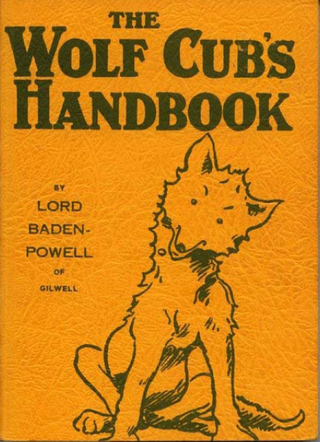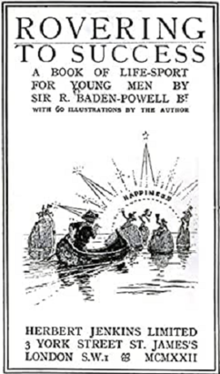
Scouting, also known as the Scout Movement, is a worldwide youth social movement employing the Scout method, a program of informal education with an emphasis on practical outdoor activities, including camping, woodcraft, aquatics, hiking, backpacking, and sports. Another widely recognized movement characteristic is the Scout uniform, by intent hiding all differences of social standing in a country and encouraging equality, with neckerchief and campaign hat or comparable headwear. Distinctive uniform insignia include the fleur-de-lis and the trefoil, as well as merit badges and other patches.

Lieutenant-General Robert Stephenson Smyth Baden-Powell, 1st Baron Baden-Powell, was a British Army officer, writer, founder and first Chief Scout of the world-wide Scout Movement, and founder, with his sister Agnes, of the world-wide Girl Guide/Girl Scout Movement. Baden-Powell wrote the seminal work Scouting for Boys, which, with his previous 1899 book Aids to Scouting for N.-C.Os and Men captured the imagination of the boys of Britain and led to the creation of the Scout Movement.

A neckerchief, sometimes called a necker, kerchief or scarf, is a type of neckwear associated with those working or living outdoors, including farm labourers, cowboys and sailors. It is most commonly still seen today in the Scouts, Girl Guides and other similar youth movements. A neckerchief consists of a triangular piece of cloth or a rectangular piece folded into a triangle. The long edge is rolled towards the point, leaving a portion unrolled. The neckerchief is then fastened around the neck with the ends either tied or clasped with a slide or woggle.

Agnes Smyth Baden-Powell was the younger sister of Robert Baden-Powell, 1st Baron Baden-Powell, and was most noted for her work in establishing the Girl Guide movement as a female counterpart to her older brother's Scouting Movement.

Henry Warington Smyth Baden-Powell KC, known as Warington, was a British admiralty lawyer, master mariner and canoeist. He wrote a book on Sea Scouting and held positions in The Boy Scouts Association, formed by his brother, Robert Baden-Powell.

The Scout Motto of the Scout movement is, in English, "Be Prepared", with most international branches of the group using a close translation of that phrase. These mottoes have been used by millions of Scouts around the world since 1907. Most of the member organizations of the World Association of Girl Guides and Girl Scouts (WAGGGS) share the same mottoes.

Scouts BSA Handbook is the official handbook of Scouts BSA, published by the Boy Scouts of America. It is a descendant publication of Baden-Powell's original handbook, Scouting for Boys, which has been the basis for Scout handbooks in many countries, with some variations to the text of the book depending on each country's codes and customs.

Rovers or Rovering is a programme associated with some Scout organizations for adults, originated by The Boy Scouts Association in the United Kingdom in 1918 to provide a programme for young men who had grown up beyond the age range of the Boy Scouts. It was adopted by many other Scouting organisations. A group of Rovers is called a 'Rover Crew'.

William Hillcourt, known within the Scouting movement as "Green Bar Bill", was an influential leader in the Boy Scouts of America (BSA) organization from 1927 to 1992. Hillcourt was a prolific writer and teacher in the areas of woodcraft, troop and patrol structure, and training; his written works include three editions of the BSA's official Boy Scout Handbook, with over 12.6 million copies printed, other Scouting-related books and numerous magazine articles. Hillcourt developed and promoted the American adaptation of the Wood Badge adult Scout leader training program.
Traditional Scouting is "old-fashioned" or "back to basics" Scouting in some form, often with an emphasis on woodcraft and scoutcraft activities. As a pluralist movement, there is no one set definition for the term, but most traditionalists share a common set of values and procedures. Traditionalists aim to return the Scout Movement to something approximating its original style and activities; rejecting the trend of modernizing the program in an attempt to widen its appeal and/or use the name "Scouts" for new programs for ever-younger children.

The Scout method is the informal educational system used in the Scouting Movement. The aim of Scouting is character training with the goal of helping participants become independent and helpful, and thereby become "healthy, happy, helpful citizens".
Scouting started in Victoria, Australia, as early as 1907 and local Boy Scout patrols and troops formed independently. Several separate central organisations began operating including Boys' Brigade Scouts, Church Lads' Brigade Scouts, Chums Scouts, Imperial Boy Scouts, Girl Peace Scouts, Imperial Boy Scouts Victoria Section, Imperial Boy Scouts Victorian Section, Gippsland Boy Scouts Association, Australian Boy Scouts, Australian Imperial Boy Scouts, The Boy Scouts Association, Life-Saving Scouts of the Salvation Army and Methodist Boy Scouts.

Baden-Powell is a 1989 biography of the 1st Baron Baden-Powell by Tim Jeal. Tim Jeal's work, researched over five years, was first published by Hutchinson in the UK and Yale University Press. It was reviewed by The New York Times. James Casada wrote in a review for Library Journal that it is "a balanced, definitive assessment which so far transcends previous treatments as to make them almost meaningless".
Lone Scouts are members of the Scout movement who undertake scout activities on their own or by distance communication, usually because they live in isolated areas or otherwise do not participate in scout activities with other scouts. A Lone Scout may have an adult Scout leader or counselor who may instruct and supervise them. They can follow the same program as other Scouts and may advance in the same way as all other Scouts.

The Wolf Cub's Handbook is an instructional handbook on Wolf Cubs training, published in various editions since December 1916. Early editions were written and illustrated by Robert Baden-Powell with later editions being extensively rewritten by others. The book has a theme based on Rudyard Kipling's The Jungle Book jungle setting and characters.

John Julian Timothy Jeal, known as Tim Jeal, is a British biographer of notable Victorians and is also a novelist. His publications include a memoir and biographies of David Livingstone (1973), Lord Baden-Powell (1989), and Sir Henry Morton Stanley (2007).

The Handbook for Girl Guides or How Girls Can Help to Build Up the Empire is the full title of the book more commonly known as How Girls Can Help to Build up the Empire. It was the first handbook for Girl Guides. The author was Agnes Baden-Powell in conjunction with (then) Lieutenant-General Sir Robert Baden-Powell. It was published in May 1912 by Thomas Nelson and Sons.

Scouting for Boys: A handbook for instruction in good citizenship is a book on Boy Scout training, published in various editions since 1908. Early editions were written and illustrated by Robert Baden-Powell with later editions being extensively rewritten by others. The book was originally a manual for self-instruction in observation, tracking and woodcraft skills as well as self-discipline and self-improvement, about the British Empire and duty as citizens with an eclectic mix of anecdotes and unabashed personal observations and recollections. It is pervaded by a degree of moral proselytizing and references to the author's own exploits. It is based on his boyhood experiences, his experience with the Mafeking Cadet Corps during the Second Boer War at the siege of Mafeking, and on his experimental camp on Brownsea Island, England.
Michael John Foster is an English priest, youth leader and an historian of scouting and other youth organisations. He was Grand Scoutmaster of the Order of World Scouts and Grand Scoutmaster and formerly the Chief Commissioner of the British Boy Scouts and British Girl Scouts. He is an ordained Anglican priest and, until 2020 when he retired, was a parish priest.
Scouting magazine was a bi-monthly publication of The Scout Association. The magazine included information, resources and support for both young people and adults involved with The Scout Association and Scouting. From 2004, it was supplied free of direct charge to adult leaders and office holders of the association. The magazine originated in July 1909 as the Headquarters Gazette, merged with other periodical publications and had several changes of title, content, format and distribution method. The last issue was published in the autumn of 2020.















